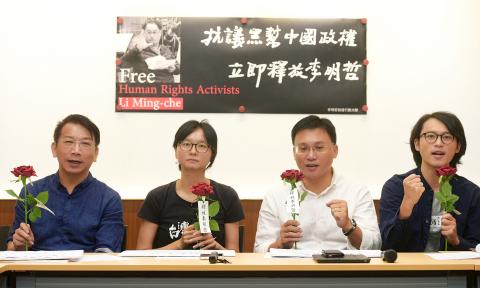Worried that detained human rights advocate Lee Ming-che (李明哲) might have been sentenced in secret, civic groups and legislators yesterday urged the government to take immediate action to protect Lee’s right to appeal.
Yesterday marked the 197th day since Lee went missing after a trip to China in March. Beijing later said he was being detained on charges of subversion of state power.
After a video was released of Lee confessing his crimes in court on Sept. 11, his situation has again become unknown, the groups said.

Photo: Chang Chia-ming, Taipei Times
The video showed that Lee was prosecuted on Aug. 8, and according to China’s Criminal Law, the court must reach a verdict within two month after accepting a case, Taiwan Association for Human Rights secretary-general Chiu Ee-ling (邱伊翎) told a news conference yesterday.
Accounting for China’s national holidays, the deadline should be on Monday, he said.
As several human rights advocates have been sentenced in China without a public announcement, the groups are worried that his case would be handled the same way and Lee will lose his right to appeal, Judicial Reform Foundation executive secretary Hsiao I-min (蕭逸民) said.
“We urge the government to clarify whether there is already a ruling in Lee’s case, and if the court has already sentenced him, to determine if he will have the right to appeal,” he said.
“If the case is not yet closed, the government should ask when the court will reach a verdict and whether Lee’s family and concerned groups can attend the court session,” he added.
The Beijing-appointed defense lawyer in the video gave up his right to defend Lee based on “jurisdiction” and “exclusion of illegally obtained evidence,” Hsiao said, adding that the prosecutor presented 70 confession documents as evidence of Lee’s guilt.
Five of the six accounts on which Lee is being prosecuted took place in Taiwan, over which China’s courts do not have jurisdiction, so if Lee is sentenced for his actions in Taiwan and has no right to appeal, the case would affect the rights of all Taiwanese, Hsiao said.
Beijing is using Lee’s case to intimidate Taiwanese, sending a message that “even if you use the Internet in Taiwan to spread the message of democracy and freedom, you might be sentenced to prison when you come to China,” Democratic Progressive Party Legislator Yu Mei-nu (尤美女) said.
“The government needs to clearly express its view on this case,” New Power Party Legislator Hsu Yung-ming (徐永明) added.

Taiwanese can file complaints with the Tourism Administration to report travel agencies if their activities caused termination of a person’s citizenship, Mainland Affairs Council Minister Chiu Chui-cheng (邱垂正) said yesterday, after a podcaster highlighted a case in which a person’s citizenship was canceled for receiving a single-use Chinese passport to enter Russia. The council is aware of incidents in which people who signed up through Chinese travel agencies for tours of Russia were told they could obtain Russian visas and fast-track border clearance, Chiu told reporters on the sidelines of an event in Taipei. However, the travel agencies actually applied

Japanese footwear brand Onitsuka Tiger today issued a public apology and said it has suspended an employee amid allegations that the staff member discriminated against a Vietnamese customer at its Taipei 101 store. Posting on the social media platform Threads yesterday, a user said that an employee at the store said that “those shoes are very expensive” when her friend, who is a migrant worker from Vietnam, asked for assistance. The employee then ignored her until she asked again, to which she replied: "We don't have a size 37." The post had amassed nearly 26,000 likes and 916 comments as of this

New measures aimed at making Taiwan more attractive to foreign professionals came into effect this month, the National Development Council said yesterday. Among the changes, international students at Taiwanese universities would be able to work in Taiwan without a work permit in the two years after they graduate, explainer materials provided by the council said. In addition, foreign nationals who graduated from one of the world’s top 200 universities within the past five years can also apply for a two-year open work permit. Previously, those graduates would have needed to apply for a work permit using point-based criteria or have a Taiwanese company

The Shilin District Prosecutors’ Office yesterday indicted two Taiwanese and issued a wanted notice for Pete Liu (劉作虎), founder of Shenzhen-based smartphone manufacturer OnePlus Technology Co (萬普拉斯科技), for allegedly contravening the Act Governing Relations Between the People of the Taiwan Area and the Mainland Area (臺灣地區與大陸地區人民關係條例) by poaching 70 engineers in Taiwan. Liu allegedly traveled to Taiwan at the end of 2014 and met with a Taiwanese man surnamed Lin (林) to discuss establishing a mobile software research and development (R&D) team in Taiwan, prosecutors said. Without approval from the government, Lin, following Liu’s instructions, recruited more than 70 software